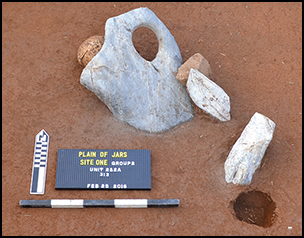Crossref Citations
This article has been cited by the following publications. This list is generated based on data provided by
Crossref.
Skopal, Nicholas
Bounxaythip, Souliya
Shewan, Louise
O’Reilly, Dougald
Luangkhoth, Thonglith
and
Van Den Bergh, Julie
2020.
Jars of the jungle: A report on newly discovered and documented megalithic jar sites in Lao People’s Democratic Republic.
Asian Archaeology,
Vol. 3,
Issue. 1-2,
p.
9.
Shewan, Louise
O’Reilly, Dougald
Armstrong, Richard
Toms, Phillip
Webb, John
Beavan, Nancy
Luangkhoth, Thonglith
Wood, Jamie
Halcrow, Siân
Domett, Kate
Van Den Bergh, Julie
Chang, Nigel
and
Zerboni, Andrea
2021.
Dating the megalithic culture of laos: Radiocarbon, optically stimulated luminescence and U/Pb zircon results.
PLOS ONE,
Vol. 16,
Issue. 3,
p.
e0247167.
Heng, Piphal
2021.
Landscape, upland-lowland, community, and economy of the mekong river (6th-8th century CE): case studies from the Pre-Angkorian centers of Thala Borivat and Sambor.
World Archaeology,
Vol. 53,
Issue. 4,
p.
643.
Pryce, T. O.
Cadet, Mélissa
Allard, Francis
Kim, Nam C.
Hiep, Trinh Hoang
Dung, Lam Thi My
Lam, Wengcheong
and
Foy, Eddy
2022.
Copper-base metal supply during the northern Vietnamese Bronze and Iron Ages: metallographic, elemental, and lead isotope data from Dai Trach, Thành Dên, Gò Mun, and Xuân Lâp.
Archaeological and Anthropological Sciences,
Vol. 14,
Issue. 1,
O'Reilly, Dougald
Shewan, Louise
Khamphouvong, Mailo
Butphachit, Amphai
Luangkoth, Thonglith
Skopal, Nicholas
and
Bounxayhip, Souliya
2022.
Ban Pha Tai: The excavation and dating of a buried megalithic jar in Xieng Khouang, Lao PDR.
Archaeological Research in Asia,
Vol. 29,
Issue. ,
p.
100336.
Cadet, Mélissa
Pryce, T. O.
Dillmann, Philippe
Sayavongkhamdy, Thongsa
Souksavatdy, Viengkeo
Luangkhoth, Thonglith
and
Chang, Nigel
2022.
Technological reconstruction of the late prehistoric primary copper production of the Vilabouly Complex (central Laos).
Archaeological and Anthropological Sciences,
Vol. 14,
Issue. 8,
Thakuria, Tilok
Bathari, Uttam
and
Skopal, Nicholas
2022.
An archaeological survey of the Assam stone jar sites.
Asian Archaeology,
Vol. 5,
Issue. 1-2,
p.
41.
Mitri, Marco
Jamir, Tiatoshi
Mepusangba
Syiemlieh, Hiambok
Darnei, Lanthanmuani
Thakuria, Tilok
and
Kharpuri, Larilin
2022.
Recent research on the stone jars of Northeast India: Evidence from East Jaintia Hills of Meghalaya.
Archaeological Research in Asia,
Vol. 31,
Issue. ,
p.
100393.
Skopal, Nicholas
Bounxaythip, Souliya
O’Reilly, Dougald
Shewan, Louise
Luangkhoth, Thonglith
and
Van Den Bergh, Julie
2023.
A field work report on newly discovered and documented megalithic jar sites in the Lao People’s Democratic Republic.
Asian Archaeology,
Vol. 7,
Issue. 2,
p.
221.
O’Reilly, Dougald
Shewan, Louise
Luangkoth, Thonglith
Domett, Kate
Halcrow, Siân
Khamphouvong, Mailo
Butphachit, Amphai
Sayavongkhamdy, Thongsa
and
Heap, Natasha
2023.
Secondary burial practice at megalithic jar site 1, Plain of Jars Laos.
Asian Archaeology,
Vol. 7,
Issue. 1,
p.
105.
Skopal, Nicholas
Bounxaythip, Souliya
Cooper, Charlie
Pradier, Baptiste
Pilgrim, Tracey
Stewart, Tahlia
Florin, Anna
Devantier-Thomas, Tate
Baker, Daniel
and
Philip, Sophie
2024.
Preliminary site report of a stone jar burial in the Lao People's Democratic Republic.
Archaeological Research in Asia,
Vol. 38,
Issue. ,
p.
100517.
Pryce, T.O.
and
Willis, Anna
2025.
Southeast Asian mainland archaeological science 1964–2034: Multiscalar relations between individuals, communities and neighbouring populations during the Neolithic, Bronze and Iron Ages (early-3rd mill. BC to late-1st mill. AD).
Journal of Archaeological Science,
Vol. 176,
Issue. ,
p.
106154.
